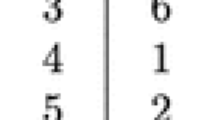Abstract
The paper investigates how far a particular procedure, called the “descending demand procedure,” can take us in finding equitable allocations of indivisible goods. Both interpersonal and intrapersonal criteria of equitability are considered. It is shown that the procedure generally fares well on an interpersonal criterion of “balancedness”; specifically, the resulting allocations are Pareto-optimal and maximize the well-being of the worst-off individual. As a criterion of intrapersonal equitability, the property of envy-freeness is considered. To accommodate envy-freeness, a modification of the basic procedure is suggested. With two individuals, the modified procedure is shown to select the envy-free allocations that are balanced, i.e. the allocations that maximize the well-being of the worse-off individual among all envy-free allocations.
Similar content being viewed by others
Author information
Authors and Affiliations
Additional information
Received: 3 March 2000/Accepted: 27 November 2000
Rights and permissions
About this article
Cite this article
Herreiner, D., Puppe, C. A simple procedure for finding equitable allocations of indivisible goods. Soc Choice Welfare 19, 415–430 (2002). https://doi.org/10.1007/s003550100119
Published:
Issue Date:
DOI: https://doi.org/10.1007/s003550100119




